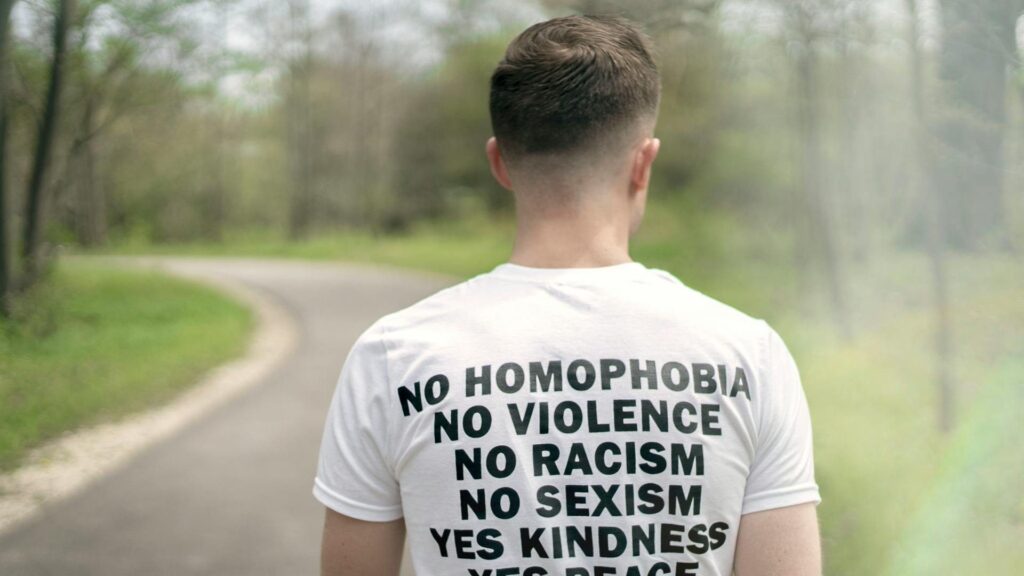The LGBTQ+ community experiences higher rates of mental health conditions than cisgender (a person whose gender identity corresponds with the sex registered to them at birth) and heterosexual individuals. In fact, LGBTQ+ folks are more than twice as likely to have a mental health condition in their lifetime.
This is partially due to the unique challenges faced by the queer community, ranging from discrimination and stigma to internalized shame and navigating complex life experiences like coming out or transitioning. All of these stressors often lead to higher rates of depression, anxiety, and other mental health concerns. Mental health is at even higher risk in certain subcommunities. For example, The Trevor Project reports that in 2023, half of transgender and nonbinary young people seriously considered attempting suicide.
This is why it can be so important to work with a therapist who understands LGBTQ+ issues if you’re part of the community. Working with a queer-affirming therapist can help you feel as safe and comfortable as possible in therapy while you work towards improving your mental health.
Read on to learn more about LGBTQ+ therapy, how to find a queer-affirming therapist, and more.
Key takeaways
-
LGBTQ+ individuals face higher rates of mental health challenges, stemming from unique stressors like discrimination, stigma, and minority stress.
-
Queer-affirming therapy supports resilience, healing from trauma, fostering self-acceptance, and building healthier relationships.
-
Directories, word-of-mouth, and initial consultations can help identify therapists who truly understand LGBTQ+ experience.
-
Teletherapy expands access to LGBTQ+ affirming therapists, particularly in areas with limited in-person options.
-
Grow Therapy simplifies the search for LGBTQ+ affirming therapists, offering filters for specialty and insurance coverage.
The role of therapy in LGBTQ+ empowerment
For queer individuals, therapy can play a major role in empowerment and self-affirmation. The right therapist can help you build resilience, heal from trauma, and more. Here are some key ways therapy can promote empowerment.
Building resilience in the face of discrimination
Unfortunately, the LGBTQIA+ community continues to face discrimination that impacts the mental health and well-being of many people. Therapy can help you cultivate improved self-compassion, self-esteem, and self-acceptance despite all of the discrimination you’ve faced, whether that’s discrimination from people you know personally or society at large.
Healing from past trauma and fostering self-acceptance
LGBTQ+ folks are more likely to experience certain traumatic experiences than cisgender and heterosexual people are, including:
- Sexual assault
- Rape
- Aggravated or simple assault
- Robbery
Not to mention, the community also experiences what’s known as socially-produced stressors or minority stress – stressors that are a result of simply being LGBTQ+. Examples of these are:
- Discrimination
- Shame
- Stigma
- Internalized homophobia
- Needing to hide their true sexual or gender identity
- Expectations of rejection
All of this can lead to increased risk of post-traumatic stress disorder (PTSD) in the LGBTQ+ community. Therapy, especially trauma-focused therapy, can help you process this trauma in a safe space.
Supporting healthy relationships and boundaries
Therapy serves as a safe space to explore and nurture healthy relationships, whether you opt for individual therapy, family therapy, or couples therapy. A therapist will help you learn to communicate in healthy ways and set boundaries. Family therapy can help repair family relationships and build understanding and acceptance within the family, while couples therapy is a great way to learn healthy conflict-resolution skills and build emotional intimacy.
Community connection through group therapy
Dealing with mental health struggles can feel isolating, especially when you’re part of a marginalized group. However, support groups and community-based therapy can help foster connection and offer a sense of camaraderie. Connecting with other queer folks can help you feel much less alone while hearing new perspectives and trading coping skills.
How to search for LGBTQ+ affirming therapists
Looking for an LGBTQ+ affirming therapist, but not sure where to start? We’re here to help.
Directories and platforms with LGBTQ+ filters
Many therapy directories and platforms have filters so you can find a therapist who’s right for you and meets all of your needs. On these sites, you can filter by specialty, including LGBTQ+ affirming therapists. One example is Grow Therapy, where you can filter by location, insurance, and specialty, including LGBTQ+.
Find LGBTQAI+ affirming therapists
Another great resource specifically for people of color in the queer community is Therapy for Black Girls, where you can find therapists of color who are queer-affirming and understand the intersectionality between race and queerness.
Word-of-mouth and community recommendations
If you have queer friends in therapy, don’t hesitate to ask for peer recommendations when looking for a trusted therapist. Hearing positive experiences can motivate you to pursue treatment. You can also look to community resources such as local LGBTQ+ centers to see if they have any go-to mental health professionals they recommend.
What to look for when searching for a queer-friendly therapist
Some therapists might call themselves “queer-friendly,” while others may call themselves “queer-affirming.” Both titles suggest a certain level of openness and understanding, but there are important differences. Queer-affirming therapists are typically more knowledgeable and experienced when it comes to LGBTQ+ issues, and also tend to be part of the community themselves. You can think of a queer-friendly therapist as one who can sympathize with you, but a queer-affirming therapist as one who can truly empathize with you. There’s also gender-affirming therapy for trans folks and nonbinary-affirming therapy for non-gender-conforming individuals.
So, if you want the most support from someone who is truly educated and understanding about LGBTQ+ issues, your best bet is to work with a professional who is queer-affirming.
The benefits of working with a therapist who understands LGBTQ+ issues.
The benefits of working with an educated queer-affirming therapist can’t be understated. There’s an added level of safety and comfort so you can be your true, authentic self that you may not feel with a another therapist.
Plus, there will be less of a need for you to educate them about your lived experiences, or the issues you face. For example, you may not need to provide explanations about coming out, pronouns, or transitioning. A queer-affirming therapist is more likely to be able to meet you where you are when it comes to things like gender identity, discrimination, relationships, family dynamics, and more.
Verifying a therapist’s expertise
When choosing a therapist, it’s crucial to verify their credentials. When it comes to seeking LGBTQ+ affirmative therapy, you can check for specialized training, continuing education, and specific experience in LGBTQ+ mental health concerns.
Navigating insurance for LGBTQ+ therapy
Luckily, insurance covers mental health care, including therapy services. However, every insurance plan is different, and there may be specific limitations on coverage. Check your plan’s benefits to get coverage details and determine your out-of-pocket costs, such as your copays.
When using online directories to filter for therapists who LGBTQ+ care, make sure to also filter by insurance. You can use Grow Therapy to find an LGBTQ+ affirming mental health provider that’s covered by your insurance.
Evaluating potential therapists
An initial conversation with a therapist can help you understand whether they’re the right fit for you. Most mental health professionals will offer a free phone consultation where you’ll get to ask them any questions about their experience helping LGBTQ+ clients.
What to ask during the consultation
Use this chance to ask everything you need to determine if they’re the right fit for you.
You can ask:
- What their experience is with LGBTQ+ clients
- If they identify as queer-friendly or queer-affirming
- How comfortable they are working with LGBTQ+ clients
- If there are any specific LGBTQ+ populations they have less experience with
- If they have experience addressing specific LGBTQ+ issues (such as gender dysphoria, coming out, or transitioning)
- What their knowledge is on intersectional identities (for example, queer and BIPOC experiences)
- If they understand pronouns and other gender-inclusive language
- If they offer a specific type of mental health care that you’re looking for (such as specialties in certain mental health conditions or therapy approaches)
- If they offer in-person therapy, online therapy/telehealth, or both
While it’s not necessary to ask personal questions, such as whether a therapist identifies as LGBTQ+, it’s okay to prioritize this aspect if it’s important to you. Some therapists disclose their identity on their profiles or websites, but if it’s not clear, you can respectfully ask during your consultation if this factor is essential to your comfort in therapy.
Red flags to watch out for
Knowing what you shouldn’t want in a therapist is just as important. Here are a few red flags:
- If they seem uncomfortable when you bring up LGBTQIA+ topics
- If they use any offensive or outdated language
- If they don’t respect your pronouns, gender identity, or sexual orientation
- If they dismiss or minimize your experiences
- If they have no professional experience working with LGBTQIA+ issues
- If they suggest unethical treatment such as conversion therapy
As always, go with your gut. If something feels off, this likely isn’t the right therapist for you.
Accessing LGBTQ+ affirming therapy in rural or less progressive areas
For certain communities, finding an LGBTQ+ affirming therapist isn’t always easy.
People who live in rural or conservative regions face significant barriers to access since there are likely only a few – if any – LGBTQ+ friendly or affirming therapists in their area. Not to mention, the available mental health professionals might not have as much experience working with LGBTQ+ folks as a therapist from a city would.
Teletherapy has become an absolute game-changer for those who live in rural or conservative areas, opening up their options by expanding their pool of therapists to choose from. When you opt for teletherapy, you can work with any therapist licensed in your state. Online directories and therapy platforms can help you find an LGBTQ+ affirming therapist in your state who provides teletherapy.
Steps toward finding the right LGBTQ+ affirming therapist
Due to the unique life experiences and challenges that the LGBTQ+ community faces, the importance of finding a queer-affirming therapist can’t be understated.
Therapy can be truly life-changing, especially once you find the right therapist for you. You can greatly improve your well-being and experience personal growth like never before.
Make sure to vet potential therapists thoroughly and ask them all your questions to ensure they truly are LGBTQ+ affirming. Remember to stay patient during the process. Don’t rush your search to find the best therapist for you.
If you’re ready to start your search for an LGBTQ+ affirming mental health professional, Grow Therapy can help. On our site, you can use our filters to search for queer-affirming therapists in your state who accept your insurance plan. Just select “LGBTQ” as the specialty.
We offer both online therapy and in-person care from qualified professionals from different backgrounds and specialties. Get started today to find the right therapist for you.
This article contains contributions from Martinique Moron, LCSW, a former Grow Therapy provider.

